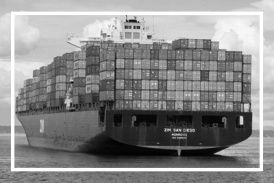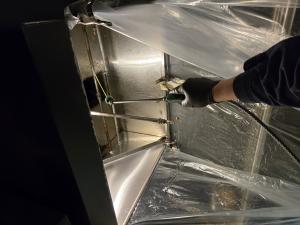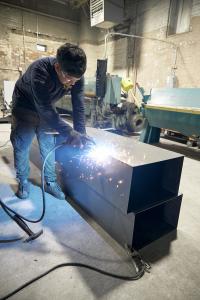NYC Fire Marshals Ramp Up Restaurant Inspections Ahead of Summer
New York City fire marshals are intensifying inspections of commercial kitchen fire safety systems across NYC.
NEW YORK CITY, NY, UNITED STATES, April 21, 2025 /EINPresswire.com/ -- New York City fire marshals are intensifying inspections of commercial kitchen fire safety systems across Manhattan, Brooklyn, Queens, the Bronx, and Staten Island as the summer season approaches. With restaurants gearing up for a seasonal surge in cooking volume, officials are cracking down on fire code violations – from grease-choked exhaust ducts to neglected fire suppression systems – to prevent a spike in kitchen fires. This citywide initiative comes amid warnings that restaurants failing to maintain their hood and sprinkler systems face heightened risks of fires and costly shutdowns. Recent fire incident case studies underscore the urgency behind the inspections. In one case, a popular Midtown Manhattan bistro was cited after fire marshals discovered its kitchen suppression system had clogged nozzles and hadn’t been serviced in over a year – far beyond the FDNY’s six-month inspection requirement. The lapse earned hefty fines and a forced temporary closure until the system was repaired.In Brooklyn, an even more dire scenario played out: an established eatery experienced a significant kitchen blaze when grease accumulation in an uncleaned exhaust duct ignited. Investigators found the restaurant had skipped professional hood cleanings for over six months, a clear violation of city rules mandating quarterly cleanings based on cooking volume.
Fire marshals note that such incidents – caused by neglected fire suppression and ventilation systems – have occurred in all five boroughs, from Manhattan to Staten Island, and are fully preventable with proper maintenance. National fire data backs up the concerns over lax maintenance. According to the National Fire Protection Association (NFPA), nearly 8,000 fires in eating and drinking establishments are reported each year in the U.S., causing about $246 million in property damage. Notably, a leading cause in roughly one out of five restaurant fires is the simple “failure to clean” grease buildup from kitchen exhaust hoods and ducts. Cooking equipment is the ignition source in the majority of these fires, and when grease-laden ventilation systems are left dirty or fire suppressors are not functioning, a small flare-up can rapidly escalate into an inferno. “Every commercial kitchen generates combustible grease vapors – it’s an unseen danger that accumulates day by day,” says a fire safety consultant and suppression system technician at Done Right Hood & Fire Safety. “Unfortunately, we still see many NYC restaurants where basic fire code practices are overlooked. Grease filters aren’t cleaned, suppression nozzles are clogged, or the required inspection tags are years out of date. These maintenance lapses are exactly what fire marshals look for, and for good reason: they can turn a minor stovetop incident into a devastating fire.” Fire officials are reminding kitchen operators that New York City’s fire code and industry standards (like NFPA 96, the national standard for commercial cooking operations) impose strict requirements to prevent such disasters. Commercial cooking exhaust systems must be cleaned and inspected at least once every three months by technicians with an FDNY Certificate of Fitness W-64 or P-64, signifying city-approved training. The NYC Fire Department explicitly requires professional cleaning “down to bare metal” quarterly, and even more frequently for high-volume or solid-fuel cooking operations, to combat grease buildup (Only FDNY-approved servicing companies with certified cleaners can legally perform this work.)
Likewise, all automatic fire suppression systems (such as hood sprinkler or chemical systems often referred to as “Ansul” systems) must be inspected, tested, and tagged every six months by a licensed Master Fire Suppression Piping Contractor. This means by the time summer begins, any inspection tag older than January will put a restaurant in violation. Beyond the hood and sprinklers, ancillary fire safety measures are also under scrutiny. FDNY regulations require at least one Class K fire extinguisher (designed for kitchen grease fires) in each cooking area, within 30 feet of cooking equipment. Kitchen staff must be trained in manual activation of the hood’s fire suppression pull station and reviewed on these procedures at least twice a year – a step often overlooked in the rush of daily service. Certificates of Fitness for on-site personnel play a role as well; for example, an F-60 Fire Guard certificate is required whenever any hot work (welding, torch use for repairs, etc.) is conducted in a restaurant, ensuring a trained fire watch is present to prevent sparks from igniting grease or other combustibles.
“Regulations like NFPA 96, the NYC Fire Code, and the certificate requirements might sound technical, but they’re literally the lifeline of a restaurant’s fire safety plan,” explains Jacob Chechkov CEO of Done Right Hood and Fire Safety. “They exist because, without regular cleaning and proactive maintenance, a kitchen can become a tinderbox. We’ve found exhaust ducts with a quarter-inch of grease coating – that’s an alarming fuel load waiting for a spark. Fire marshals are ramping up inspections now to catch these hazards before the summer crowds arrive.” Summer brings unique fire risks for restaurants. The combination of longer operating hours, higher customer turnout, and hotter ambient temperatures means cooking appliances work harder and produce more heat and grease. Outdoor grilling at catered events and the addition of temporary cooking stations can introduce hazards if not properly controlled. “Summer in NYC is peak season for restaurants, and kitchens are pushing to meet demand,” notes Chechkov. “If a suppression system is going to fail or a duct is going to ignite, it will likely be when everything is running full blast – which is often in the summer. We advise all operators: don’t wait until a fire marshal finds the problem or until a fire breaks out.
By ramping up enforcement now, the FDNY Bureau of Fire Prevention aims to reduce the likelihood of dangerous restaurant fires during the busy summer period. Operators and building owners are urged to cooperate with inspections and take corrective actions swiftly. The message is clear: safety compliance is not an option, but a necessity. A single grease fire can not only endanger lives but also shutter a business indefinitely. As Jacob Chechkov and the rest of the Done Right Hood and Fire Safety team emphasizes, “Staying on top of fire safety – cleaning your hoods, checking your systems, training your people – is ultimately about protecting your livelihood and your community. When the fire marshals knock on your door this summer, the goal is to have zero issues for them to find.”
Gabriel Jean
Done Right Hood & Fire Safety
+1 2126603232
email us here
Visit us on social media:
Facebook
LinkedIn
Instagram
YouTube
Legal Disclaimer:
EIN Presswire provides this news content "as is" without warranty of any kind. We do not accept any responsibility or liability for the accuracy, content, images, videos, licenses, completeness, legality, or reliability of the information contained in this article. If you have any complaints or copyright issues related to this article, kindly contact the author above.
The Code Is Helping People Reclaim Direction in a Distracted World
Restaurant Asia 2025 - Insightful Dialogues, Strategic Alliances and Innovative Solutions
Mark Gilbert, CEO of ATN, on Boosting F&I Profitability Without Losing Buyer Trust
Kalendarium
Więcej ważnych informacji
 Jedynka Newserii
Jedynka Newserii

 Jedynka Newserii
Jedynka Newserii

Handel

Ważą się losy wymiany handlowej między Stanami Zjednoczonymi a Unią Europejską. Na wysokich cłach stracą obie strony
Komisja Europejska przedstawiła w poniedziałek propozycję ceł na import z USA o wartości 72 mld euro, co ma być odpowiedzią na nałożenie 30-proc. stawek na import z UE zapowiedziane przez Amerykanów w poprzednim tygodniu. Przedstawiciele KE wciąż widzą jednak potencjał kontynuowania negocjacji. Zdaniem europosła Michała Koboski brak porozumienia lub uzgodnienie stawek wyższych niż 10-proc. nie tylko zaszkodzi obydwu stronom, ale i osłabi ich pozycję na arenie międzynarodowej.
Handel
Nie tylko konsumenci starają się kupować bardziej odpowiedzialne. Część firm już stawia na to mocny nacisk

Kwestie równoważonych zakupów stają się elementem strategii ESG. Dostawy energii, zamówienia surowców i materiałów do produkcji czy elementów wyposażenia biur – na każdym etapie swoich zakupów firmy mogą dziś decydować między opcjami bardziej i mniej zrównoważonymi. Dotyczy to także zamówień rzeczy codziennego użytku dla pracowników czy środków czystości – wskazują eksperci Lyreco, e-sklepu, który prowadzi sprzedaż produktów do biur, pokazując ich wpływ na środowisko czy efektywność pracy.
Prawo
Unia Europejska wzmacnia ochronę najmłodszych. Parlament Europejski chce, by test praw dziecka był nowym standardem w legislacji

Parlament Europejski chciałby tzw. testu praw dziecka dla każdego aktu prawnego wychodzącego z Komisji Europejskiej. – Każda nowa legislacja Unii Europejskiej powinna być sprawdzana pod kątem wpływu na prawa dziecka – zapowiada Ewa Kopacz, wiceprzewodnicząca PE. Jak podkreśla, głos dzieci jest coraz lepiej słyszalny w UE i jej różnych politykach. Same dzieci wskazują na ważne dla siebie kwestie, którymi UE powinna się zajmować. Wśród nich są wyzwania w obszarze cyfrowym i edukacyjnym.
Partner serwisu
Szkolenia

Akademia Newserii
Akademia Newserii to projekt, w ramach którego najlepsi polscy dziennikarze biznesowi, giełdowi oraz lifestylowi, a także szkoleniowcy z wieloletnim doświadczeniem dzielą się swoją wiedzą nt. pracy z mediami.









.gif)

 |
| |
| |
|